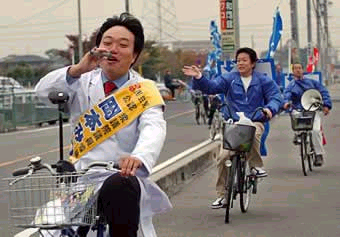
The adage goes like this: leave out the eggs because you'd like to try it differently, and you bake a poor cake. The same goes for modifying election laws from the more successful standards set in America and Britain. Yesterday we gave Japanese politics a quick glance in anticipation of Sunday's general election. As it is, foreigners may be looking forward to the event more than native voters - and only then marvelling at Japanese disinterest:
Japanese politics and elections lack the kind of spectacle, political enthusiasm and festivities that one witnesses, for example, in the United States during presidential elections or in countries such as India, where almost everyone becomes immersed in politicking at general elections. In Japan, fewer people turn out on an election day as trust in politics and politicians remains low.
William Chapman, former Tokyo bureau chief of the Washington Post, describes traditional Japanese campaigning:
In most democracies, political campaigns are thought of as vehicles that draw citizens into politics. In Japan the campaign is yet another example of how the system has come to insulate people from politics. The word campaign is here used advisedly, because it bears little resemblance to those in other modern democracies. It consists in large part of scenes like this: A car mounted with loudspeakers moves slowly through a neighborhood street. A smiling man, the candidate, waves at passing pedestrians, his white-gloved hand extending through an open window (the white glove being a symbol of purity). From the loudspeakers comes the shrill voice of a woman (a campaign aide) shrieking, over and over, the candidate's name and the greeting, "Doozo Yoroshiku." And that is the biggest part of the political campaign in Japan.
Chapman goes on to list the myriad regulations that effectively prevent a politician from spending any appreciable time with the electorate; presenting his platform, discussing issues, connecting with the population. As of 1991, when Chapman's book Inventing Japan was published, even door-to-door walks were illegal. Under such restrictions, the grassroots potential is nigh well impossible. Where Japanese authorities sought to limit corruption and stamp out extremism - laws set by the Occupation were far, far more lenient and reflective of America - they have created a lifeless cycle of popular election.
Most frustratingly of all, it seems that, absent a sweeping public outcry, only the most brazen populist could hope to challenge election laws. As with any campaign law restricting free speech, incumbents benefit enormously; and incumbents are the men and women writing the laws. Liberal Democratic Party members would have little motivation to destroy the systems that support entire political careers.
Need Japan's domestic woes become severe before the country reassesses its deep electoral flaws? Even if that's the case, a minor calamity would be worth better, more competitive elections whose winners could bring about some palpable reform. Observers, however, believe that an opposition-party victory by the Democratic Party of Japan could throw just the right amount of cold water on the Diet - so Mr. Mitsunori Okamoto above had better get peddling.